It’s sweet your dog wants to cozy up to you and lick your face. Except, that breath is atrocious! If you find yourself dreading your best friend’s doggie breath, you probably want to know what you can do about it because let’s face it, breath mints aren’t an option.
The thing to know about bad dog breath is that it’s more than unpleasant; it could be a sign of health problems.
Your dog’s mouth is a window into their overall health because that stinky breath can signify liver, kidney, or gum disease.
Fortunately, you can fend off health problems and dental disease by finding out the common causes of bad breath and ensuring your pooch gets proper dental care. After all, teeth brushing is not just for people!
Common Causes of Bad Dog Breath
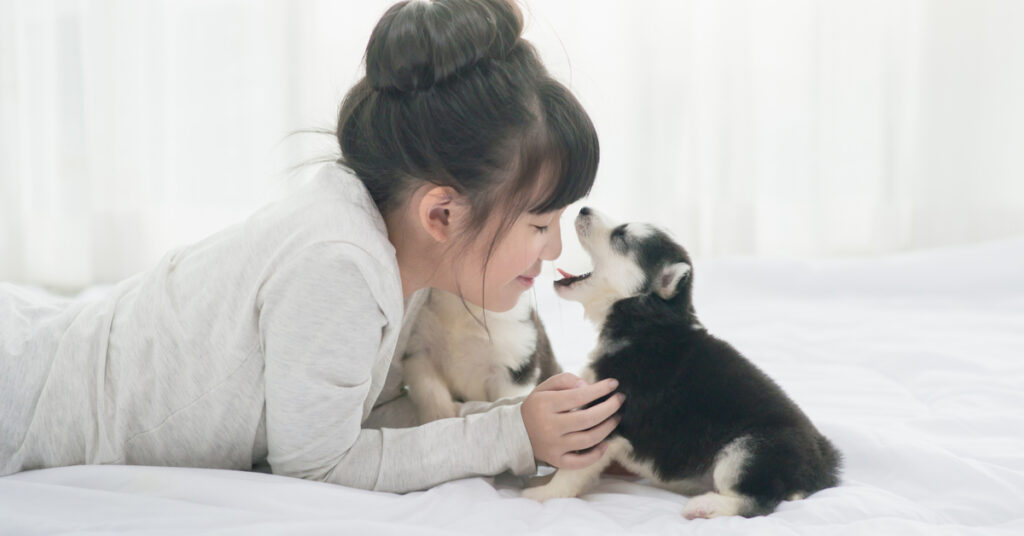
Sure, your dog’s breath might stink because of something they ate. Pet parents know their dog is not as selective as they’d like about what goes into their mouths.
Decaying squirrel? Yes, please! Let me shove my snout in for a good sniff!
It might be gross to us, but our pups have a whole different take. However, rotting things isn’t the only reason your dog’s mouth might smell foul.
Here are four potential causes for why your dog’s breath smells.
1. Periodontal Disease
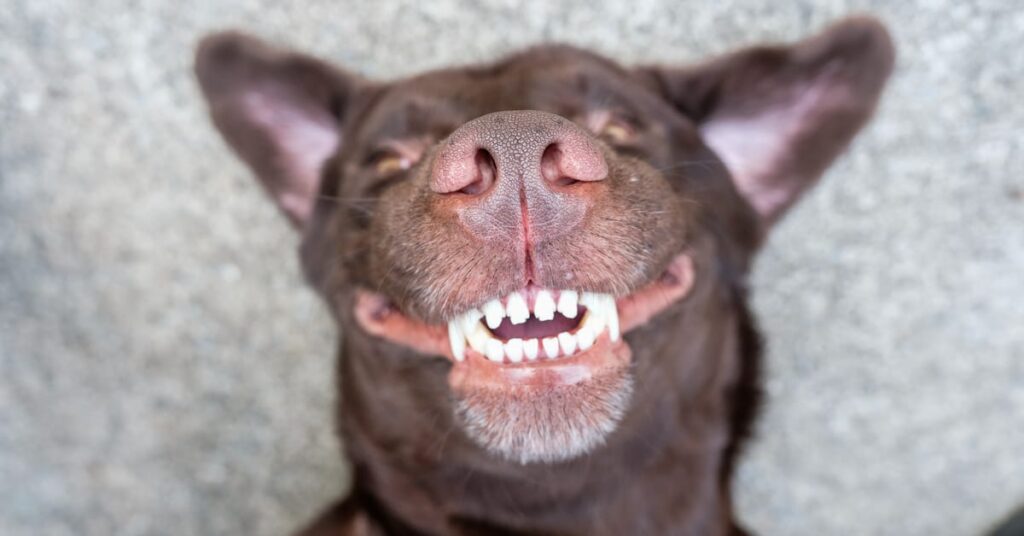
Periodontal disease or gum disease is common in dogs. In fact, some veterinarians say gum disease affects 80% of dogs and cats (or more.) It shows up in red, irritated gums and darkened teeth where your dog’s teeth meet the gums.
Take a look at your dog’s teeth and gums. Are the gums a healthy pink? Or do they look red and irritated? What about the teeth? Are they clean and white? Or are they dark in places?
Tartar and plaque buildup hang out along the gum line and between the teeth, leading to dark marks on the teeth. This lack of oral hygiene leads to bad dog breath if left untreated. Besides bad breath, plaque and tartar also cause blackened, rotten teeth, cavities, and infection.
The best oral health treatment is a deep dental clean at your veterinarian’s office, followed by at-home maintenance with regular brushing and dental chews.
2. Eating Unsavory Things
We love our dogs, but some of them make – how do we say – questionable dining choices.
From snarfing rotten garbage to snacking on kitty poop, our beloved dogs will eat gross things if they can get to them. To put the kibosh on such dining habits, you’ll want to keep your dog out of the trash and away from the kitty litter box.
3. Kidney Disease
As you may know, the kidneys are essential to your dog’s health. The purpose of the kidneys is to filter blood and clean out toxins.
When the kidneys function well, your dog eliminates the waste through his urine. However, if his breath smells like urine, that can be a sign of kidney disease because of toxins in the bloodstream.
4. Liver Disease
Terrible breath can also be a symptom of liver disease, thanks to a build-up of toxins. Other symptoms of liver disease are a bloated abdomen, yellowing corneas, vomiting, and weight loss.
Bacteria in the bloodstream (from ignored oral hygiene) can lead to liver or kidney disease.
How to Fix Bad Dog Breath & Promote Good Oral Health
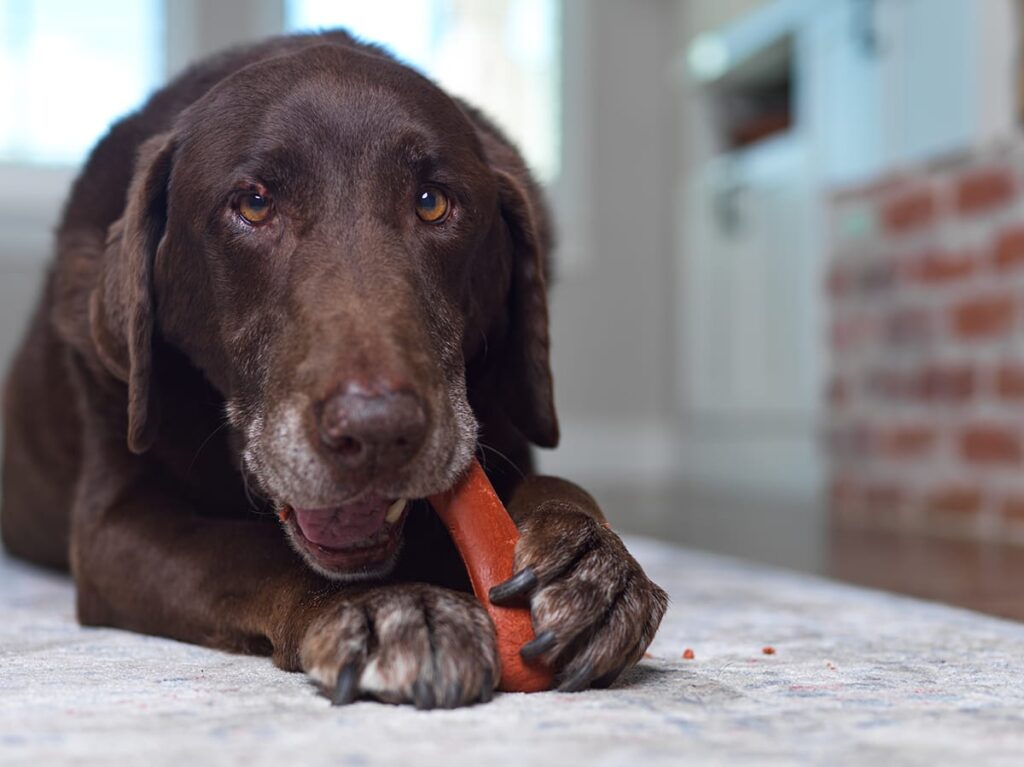
Imagine how your breath might smell if you never brushed your teeth. Your best friend is the same. They also need good oral hygiene if they’re to have fresh breath and good health. Regular brushings (with beef-flavored toothpaste!), dental chews, and dental cleanings promote good oral health.
If you start regular brushings when your dog is a puppy, you’ll have an easier time convincing them to let you brush their teeth later. Special pet toothpaste is safe for your pup to swallow and is in dog-friendly flavors like chicken and beef.
Special dental treats help clean your dog’s teeth by reducing tartar and plaque buildup. The scraping action of tooth against chew really does help scrap the teeth clean. Dental chews are an excellent addition to your arsenal of doggie dental health aids.
Another thing that helps is chew toys with nylon threads. Some can act as dental “floss” to reduce the plaque buildup on your dog’s teeth.
Water additives can also support good oral health and prevent tooth decay. These additives have enzymes that reduce plaque buildup. You can add these to your dog’s water as an extra layer of protection.
Tip: If your dog’s bad breath isn’t related to underlying health issues, try mixing your dog’s food with a little bit of plain Greek yogurt.
How to Brush Your Dog’s Teeth
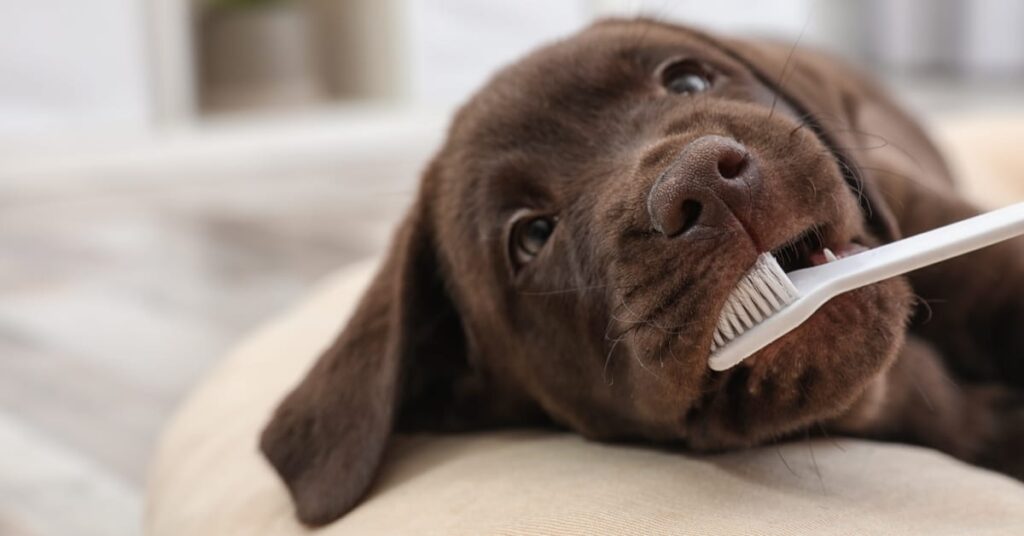
Like nail trimming and ear cleaning, it’s easiest to acclimate your dog to regular toothbrushing when they’re puppies. However, no matter your dog’s age, you’ll want to introduce it slowly.
- Introduce your dog to the idea of teeth brushing. You can start with your bare finger or a soft cloth wrapped around your finger and gently rub your dog’s teeth.
- Add toothpaste. Once your pup is ok with you touching his teeth, it’s time to add dog toothpaste. Do use pet-safe toothpaste because dogs tend to swallow it. A lot of human toothpaste has ingredients that aren’t good for dogs. For example, sweeteners like xylitol can be toxic for our four-legged friends, yet, it’s in many people’s toothpaste.
- Introduce your dog to the toothbrush. Let them sniff it, lick it, paw at it but maintain your hold on it and brush your dog’s teeth. You can start with the sharp canine teeth or whichever you can get to the easiest. Don’t feel you have to brush all your dog’s teeth at once, either. You can start slow and do just a section at a time until your dog is more accepting of the process.
Ideally, you’ll work your way up to daily brushing in between deeper veterinary teeth cleaning. Then, you can add water additives and dental chews to help reduce tartar buildup.
As you can see, dental care is essential for your pup’s health, so if it’s been a while since your pooch’s last checkup, it makes sense to schedule one as soon as possible. That way, your pup’s breath will be fresh, and you’ll have a health update.
Mint-infused chew toys to help between brushings

Orbee-Tuff Football Treat-Dispensing Dog Chew Toy, Brown
Play ball with Outward Hound’s Sport Ballz treat stuffer toys! With different sizes and sports to choose from, like basketballs and soccer balls, these bouncy yet durable fetch and treat-dispensing dog toys provide the playtime enrichment your sporty, treat-loving dog craves. Sport Ballz are made with our signature Orbee-Tuff material that is tough yet gentle on dogs’ teeth, providing the perfect amount of…

Orbee-Tuff Planet Ball Treat-Dispensing Dog Toy, Medium
Rated a top product by numerous magazines and called the “world’s best dog ball” by industry experts, the Orbee-Tuff Ball is what put Planet Dog on the map! This durable and bouncy dog toy is made free from BPA, lead, and phthalate with materials that you can trust. An ideal fetch and chew toy with Natural mint oil infused to help freshen your dog’s breath as they chew and play. Available in multiple sizes…
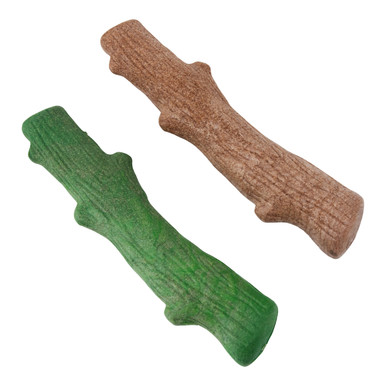
Dogwood Wood Alternative Dog Chew Toy, Original & Fresh Breath 2-pack, Multi, Large
A safe and long lasting alternative to chewing real wood sticks, Petstages Dogwood product line has all the taste and texture of a natural tree branch, but will last much longer and won’t splinter and cause potential harm to your beloved pup. Made in the U.S.A. to ensure quality and care, Dogwood combines real wood with lead-free and phthalate-free synthetic strength, making it a chew toy favorite…
This post contains affiliate links. If you make a purchase after clicking one, Outward Hound may receive a small commission.
 Amazon
Amazon Chewy
Chewy
